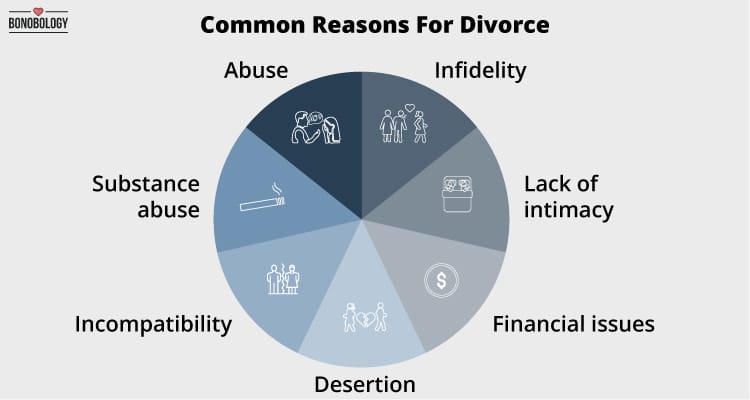There is no doubt that divorce is a painful process. Other than your inner battles, there are the lengthy court proceedings, division of assets, child custody, and similar tussles. Add to this a soon-to-be ex-partner who is out to get you with sneaky divorce tactics, and things can get really ugly.
The tricks your partner may have up their sleeve may take you by surprise, but for divorce lawyers these tactics are pretty common. Which is why insights from a divorce lawyer can help you keep your guard up and be ready with the correct defense.
We consulted lawyer Shonee Kapoor, a dowry, divorce, and separation consultant with expertise in misuse of matrimonial laws to understand the tactics people employ to get an upper hand in court and how we can learn to protect ourselves from the wrath of a vindictive ex.
9 Sneaky Divorce Tactics And Ways To Combat Them
Table of Contents
We asked Shonee how common it was for spouses to resort to cheap tricks and what he feels about it as a lawyer. Shonee said, “Though I see various strategies and tactics employed by warring couples to get rid of each other, the couples who have gone through a peaceful divorce are the ones who have talked to each other honestly and directly.”
“Being separated doesn’t always mean that bitter battles have to be fought and that you have to fool your spouse,” he added. Regardless, “All is fair in love and war” seems to be just the motto some people tend to abide by when dealing with the process of divorce. They will go to any measure to one-up their partner, to gain an advantage, considering there is so much at stake during a divorce. Let us look at some sneaky divorce tactics and how to combat them.
1. Hiding income and assets
During a divorce, both spouses are required to disclose their incomes and any assets they may have, such as details of bank accounts, property, valuables, investments, etc. A spouse may however try to hide this information to either seek support in the form of alimony or to avoid paying financial assistance in the form of child support or alimony. They might also do that to hide a significant fund from being disbursed. Here’s how people usually do that:
- By not disclosing information
- By transferring money to an offshore account or to a relative’s account
- By making large purchases in someone else’s name
- By hiding valuables in undisclosed locations
If you want to divorce your wife and keep everything, or your husband, this is what you might try to pull off. In fact, the worst sneaky divorce tactics may include many more ingenious ways to hide assets.
How to combat financial fraud by a spouse
If you see your partner make a large purchase or if you notice anything sneaky in your joint finances, bring it up immediately with your divorce lawyer. They may advise you to consult a forensic accountant to review all bank statements and other relevant paperwork. It is entirely possible to trace all assets through the electronic trail of receipts, transfers, and withdrawals.
You also have the ‘discovery process’ tool at your disposal where your lawyer can make formal requests or demands for information from your spouse that they must legally comply with. This can help disclose information they are trying to hide. For example, your lawyer can ask your spouse for:
- Formal disclosures: Your spouse can be asked to produce financial documents
- Interrogatories: They must answer to written questions under oath
- Admission of facts: They must deny or accept certain statements. No response means acceptance of the statements
- Subpoenas: A third party such as the bank or your partner’s employer can be subpoenaed to provide information such as financial records
- Entry upon land for inspection: You can be granted access to property or to an item such as a safe box or a jewelry box for inspection
Related Reading: Divorcing A Narcissist Husband – What You Should Know
2. Engaging in voluntary underemployment
This is another form of financial sneaky divorce tactic. Because it’s so sneaky, genius, and complex, it deserves a separate space for discussion. To evade the responsibility of having to pay for child support or alimony, a person may intentionally choose to take up a job that is much beneath – financially speaking – their qualification.
An anonymous user asks on a legal support website, “My ex-husband has done everything to try to get out of child support. He defaulted once my son turned 18, but my son was still in high school, then defaulted again and hasn’t paid any child support since my son has graduated. We still have a 14-year-old son. He all of a sudden has become very involved in his church and I’m afraid that he has or is going to use the excuse of doing missionary work to get out of child support.”
How to deal with a spouse who would rather earn less than pay for child support
There is a reason this sneaky tactic has a predefined name. It’s called voluntary underemployment, and the court understands why your partner is intentionally choosing to earn much less than what they are capable of and what is available to them. You should know that this underhanded behavior is easy to thwart if you have a skilled lawyer. You can bring this up with your lawyer who will then bring this up in court after thorough investigation and gathering of evidence.
3. Intentionally delaying things
Your spouse may try to delay the divorce process for numerous reasons, the most spiteful of it being the evil desire to frustrate you and cause you distress. A vengeful spouse will stall and delay to either buy time for themselves, or to cripple you with high legal costs so the divorce is no longer a sustainable option for you. Causing obstruction in divorce proceedings is one of the most common narcissist divorce tactics and forces you to agree to an unfair settlement. Delay tactics that your spouse may try are:
- Declining offers of negotiation
- Taking every little thing to court
- Refusing to comply with requests
- Refusing to sign
- Making excuses for not showing up
- Routinely requesting extensions or canceling depositions.
How to deal with a spouse stalling the divorce
If you think your partner is intentionally making sure things don’t get anywhere, bring it up with your lawyer. Do not worry, the judge will notice your partner’s sneaky divorce tactic and can create pressure on your spouse to comply. You have the option of filing a formal motion asking the judge to impose a suitable sanction against your partner for wasting everyone’s time. You can also request the court for a default judgment.
Related Reading: Divorce Counseling: Benefits Of Pre- And Post-Divorce Therapy
4. Making false allegations
The desire for revenge, or to win, or to have things your way, or the sheer unwillingness to compromise can lead people to stoop to unprecedented levels. Divorce lawyers tell us that spouses will make false allegations on their partner to have things go their way. This can be one of those dirty divorce tricks for child custody or to limit visitation rights of one’s spouse. They can also do so just to gain the court’s sympathy so that the court rules in their favor.
Most common allegations someone might use against their partner in divorce are:
- Child neglect
- Child abuse
- Alcoholism or drug addiction
- Domestic violence
- Adulterous behavior
- Abandonment
- Impotency
How to handle a maligner
Smear campaigns can cause a lot of harm, not just to your stance in the divorce proceedings but to your self-worth and pride. A hot-headed spouse can hit you where it hurts the most, since these are the things that can be used against you in a divorce.
Firstly, you need to remain calm and avoid jumping back at them with an answer or, worse, with false accusations of your own. No matter how unfair it seems, you must comply with any temporary measure that has been placed on you by court’s order. Your spouse will be waiting for you to make a mistake so that their allegations are proven correct.
Secondly, the only way to counter false accusations is with facts and with patience. When dealing with false allegations, it is important that you are 100% honest with your legal counsel. Let them know of your situation openly so that they can represent your case to the best of their capability.
5. Feigning physical ailments
No, this is not just a tactic employed by a fifth grader to avoid going to school. And, yes, you read that right! During divorce proceedings, lawyers regularly see spouses faking a physical ailment or a disability to influence the proceedings. The ‘how’ depends on the details of the case. Shonee shared with us two cases which would help you catch the drift.
Case 1: Husband (Shonee calls him H1) wanted to end the marriage due to incompatibility with his wife (W1). H1 cooked up a story of how he fell during his office hours and suffered nerve damage in his legs making him immobile. H1 kept leading the life of a disabled person, including attending his divorce proceedings in court as a disabled man. However, he ‘lost his disability’ within 6 months of his divorce. Shonee says, “The only way this could have been found out was by more tests and visits to the doctor from W1’s side.”
Case 2: W2 did not want to consummate her marriage with her husband, H2. She kept pretending that she was suffering from a vaginal disorder which was not letting her establish conjugal relations with her husband. W2 vehemently avoided doctor’s visits or any treatment prescribed by doctors which led to frequent altercations between the couple. The final uncontested divorce settlement included H2 paying wedding expenses to W2. “This too could have been avoided with due diligence by H2 and his legal counsel,” says Shonee.
How to respond to a lying spouse who is pretending to be ill/disabled
The only way to counter this is through strict investigation and thorough follow-up with doctors. If you think your partner may be faking an illness to either delay divorce proceedings or to gain any favor, please bring it up with your legal aid who should advise you the best route for such a situation. They may even advise you to consult with a legal investigator or a private one.

6. Alienating your children from the other spouse
Intentionally distancing your children from your spouse is one of the sneakiest divorce tactics that’s also the most vicious. The aim is to damage your relationship with your child to gain an advantage over you with regards to custody rights. Such partner either wants to gain primary custody of your child/children or this is simply an ego battle or power struggle between spouses. This is extremely and especially harmful for the children involved and amounts to emotional child abuse.
Unfortunately, this is fairly common and is called ‘parental alienation’ in legal jargon. Which means your lawyer and the judge are very much aware that your partner can attempt this trick. Your spouse may be doing this by:
- Speaking ill of you to your child
- Trying to manipulate your child into spending less time with you through reward or punishment
- Making false accusations against you in front of your child
- Not honoring your visitation rights
- Making excuses to curtail communication between you and your child
How to combat parental alienation
If your partner is intentionally damaging your relationship with your child, speak to your lawyer about it. Even if your state does not have direct laws against parental alienation, this can still be brought up in court. Criminal response/custody response/civil remedies such as a contempt of court order can be sought. Shonee says, “Contempt applications should be worked upon and the accused should be taken to task.”
There was an overpowering presence of a book recommendation on a Reddit post on parental alienation. The recommendation was made by users going through parental alienation by a spouse or an ex. The book is called Divorce Poison: Protecting The Parent-Child Bond From A Vindictive Ex by Dr.Richard A. Warshak and may prove valuable when navigating this tricky terrain.
Related Reading: Divorce And Children – 8 Deep-Seated Impacts of Separation Parents Must Know
7. Increasing parenting time to reduce child support burden
The amount of child support obligation for each parent depends on the parent’s income and the amount of time they spend with their child. If a child spends more than a certain number of overnighters with the non-custodial parent, the child support burden on them is recalculated (and reduced). Which is why a non-custodial parent may ask for increased parenting time solely with the aim of reducing their child support burden.
There is nothing wrong with a parent wanting to spend more time with their child. But it is observed that in the cases where it is done with an ulterior motive of paying less money in child support, such a parent ends up handing off the child to friends or family members or leaves them at work, instead of actually spending time with the child. In case of blended families, a child may need special attention to be integrated into the new family, but that may not be the case with such negligent parent.
How to respond to a spouse lying about wanting to spend more time with the kids
If you have an intuition that this is why your spouse is asking for increased time with the child, bring this up with your attorney immediately. Your attorney will ensure that your spouse is legally warned of the consequences for flouting the privilege of increased visitations.
If they have already been granted increased parenting time but are misusing the privilege, your attorney can take the issue to court and your spouse may be charged for child neglect as well as contempt of court.

8. Moving out of the state with the kids
Your ex may try to take the kids and move out of the state you reside in for various reasons. They may do so to distance the kids from you or to move the divorce case to a state with a more favorable legal framework. If they do it on a whim, and without informing the court, you shouldn’t have much to worry about, as this is definitely frowned upon by the court. In fact, this should eventually turn out to be in your favor.
However, if they have done their homework well, and have created a good reason to do so, this will affect the outcome of your divorce case. They may prove to the court that the new state has better schools or educational opportunities for your child. They may also have a more lucrative job offer in the other state. In such cases, if your child is already living away from you and for “good reason”, you may lose out on equal or primary custody rights.
How to deal with a runaway spouse
This is why it is crucial that you proactively assert equal custody even before the court proceedings begin. An efficient lawyer will advise you to focus on gaining 50/50 joint custody split on an interim basis. If there was already a custody order or agreement in place, and your ex has violated that, your attorney can file a motion against the violation of the order and compel the return of the child. Get in touch with a child custody lawyer without delay to find out the best strategy for you.
Related Reading: How To Leave A Marriage Peacefully – 9 Expert Tips To Help
9. Creating conflict of interest with your potential lawyer
Once a person meets with an attorney and discusses their case, they are bound by attorney-client privilege irrespective of getting hired for the case or not. This means that they can not speak to your spouse about the case. They can not entertain them, let alone represent them, even if they wanted to. In fact, not just them, the entire law firm must maintain this attorney-client privilege. This rule is meant to protect everyone’s interests by avoiding any conflict of interest.
However, this rule may get turned into one of those dirty tricks to gain unfair advantage over one’s spouse. This is also called “conflicting out” a legal advisor. A spouse may get in touch with many top lawyers in the area and discuss the case in detail, solely with the aim of making them out of bounds for their spouse. Heidi Klum is said to have famously adopted this trick to screw over her husband in the divorce.
How to respond to being “conflicted out” of a lawyer
Our expert’s advice is to first focus on preventing this altogether by making sure you hire a good divorce attorney as soon as divorce becomes a consideration. Set up appointments with your preferred lawyers as soon as possible.
But if you have already been “conflicted out” by your soon-to-be ex so that you can not talk to any of the top lawyers in your area, you still have the option of finding a great lawyer from outside. This will, of course, add to your cost and efforts, but it is your best bet. A good lawyer will help you prove in court that you have been a victim of this unscrupulous tactic and you can even get your spouse to pay for the extra costs.
Key Pointers
- Spouses often resort to playing cheap tricks to gain unfair advantage in the divorce process or to harm the other parties’ chances at a win
- They may also play dirty solely for the aim of taking revenge, or with a sadistic desire to see their partner suffer
- Such sneaky divorce tactics may include hiding assets, engaging in voluntary underemployment, intentionally stalling things, making false allegations, conflicting one’s spouse out by going “lawyer shopping”, among other moves
- Some sneaky divorce tactics involving children are moving the kids out of state, alienating children from the other parent by badmouthing them, misleading or manipulating one’s child against the other spouse, or hampering communication between them
- A good reminder to combat dirty tactics is to listen to your gut and follow through. Find a skilled lawyer, be open and honest with them, listen to and follow their advice and be proactive during the divorce proceedings
Divorces are not just legal separations, they are lengthy battles of child custody rights, business valuation, asset divisions, alimony and child support, and most importantly, ego wars. If your partner is hell-bent on playing dirty, or if your partner is a covert narcissist, you might not see a very smooth divorce. Your only option in that case would be to be proactive in your approach, hire the best legal team for yourself as soon as possible, and listen to their advice!
The Top Rules Of Separation In Marriage To Make It Successful
Your contribution does not constitute a charitable donation. It will allow Bonobology to continue bringing you new and up-to-date information in our pursuit of helping anyone in the world to learn how to do anything.























Featured
The Hidden Benefits Of Divorce
Top Legal Tactics for Alimony Disputes Between Parents
Divorce Regret: What Is It, Signs, And Ways To Deal
The Pros And Cons Of Being Your Own Divorce Lawyer
15 Subtle Yet Strong Signs Your Marriage Will End In Divorce
10 Things To Do When You Are Thinking About Divorce
10 Tips For Divorced Parents To Handle Joint Custody Effectively
15 Most Common Reasons For Divorce
How To Cope With Divorce As A Man? EXPERT ANSWERS
11 Ways To Remain Sane During a Divorce
7 Important Things To Know About Dating While Separated
The Top Rules Of Separation In Marriage To Make It Successful
Lonely After Divorce: Why Men Find It So Hard To Cope
How To Rebuild Life After Divorce: Handling Kids, Money, Dating, And Self-Love
Failed Celebrity Marriages: Why Are Celebrity Divorces So Common And Expensive?
Surviving Divorce at 50: How To Rebuild Your Life
Gray Divorce 101 – A Guide To Divorce After A Long Marriage
Expert Advice – When To Call It Quits In A Marriage
8 Examples Of Unhealthy Boundaries With Ex-Wife
7 Predictors Of Divorce You Should Be Aware Of